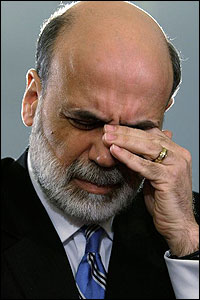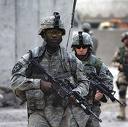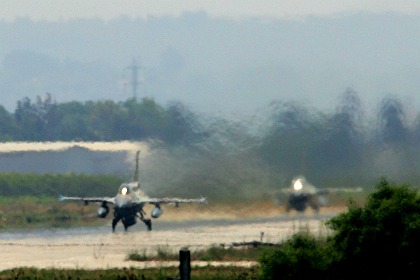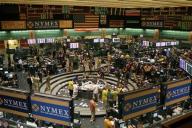Source: YouTube
Month: July 2008
Europe may push the Fed to raise rates
The European Central Bank is expected to boost a key rate Thursday in order to fight inflation. The move may cause a weaker dollar and force the Fed’s hand.

NEW YORK (CNNMoney.com) — The fireworks may come a day early for the financial markets if the European Central Bank, as expected, raises interest rates on Thursday.
If the ECB, Europe’s counterpart to the Federal Reserve, hikes rates, that could put even further pressure on the anemic dollar and send commodity prices even higher.
The ECB will announce its decision on interest rates early the morning of July 3 and will hold a press conference shortly thereafter to discuss the decision.
Members of the ECB, most notably its president Jean-Claude Trichet, have been talking loudly about inflation concerns in recent weeks and have hinted that a rate hike will take place at Thursday’s meeting.
If the ECB does raise rates by a quarter-of-a-percentage point, that would leave its benchmark short-term rate at 4.25%. By way of comparison, the Fed’s federal funds rate is just 2%.
Dow suffers worst 1st half since ’70
Related articles and videos:
– Fortis Bank Predicts US Financial Market Meltdown Within Weeks
– Barclays warns of a financial storm as Federal Reserve’s credibility crumbles
– Jim Rogers: Avoid The Dollar At All Costs
– Ron Paul on Iran and Energy June 26, 2008
– Marc Faber: ‘Misleading’ Fed Should Let Banks Fail
NEW YORK (Reuters) – The Dow and S&P 500 were little changed on Monday on the final trading day of the second quarter as record oil boosted energy shares, offsetting weak financial stocks amid nagging concerns of further credit losses.
But even with the pause on Monday, the Dow and S&P posted their worst one-month drop since September 2002. The Dow also suffered its worst first half since 1970.
The Nasdaq ended the session lower, hurt by a drop in the shares of Yahoo as it battles with shareholders after takeover talks with Microsoft fell apart.
U.S. Military to Patrol Internet
Related article and video: – Air Force Aims for ‘Full Control’ of ‘Any and All’ Computers
WASHINGTON, June 30 (UPI) — The U.S. military is looking for a contractor to patrol cyberspace, watching for warning signs of forthcoming terrorist attacks or other hostile activity on the Web.
“If someone wants to blow us up, we want to know about it,” Robert Hembrook, the deputy intelligence chief of the U.S. Army’s Fifth Signal Command in Mannheim, Germany, told United Press International.
(…and the place where you can read about any planned terrorist attack is the Internet, of course!)
In a solicitation posted on the Web last week, the command said it was looking for a contractor to provide “Internet awareness services” to support “force protection” — the term of art for the security of U.S. military installations and personnel.
“The purpose of the services will be to identify and assess stated and implied threat, antipathy, unrest and other contextual data relating to selected Internet domains,” says the solicitation.
Hembrook was tight-lipped about the proposal. “The more we talk about it, the less effective it will be,” he said. “If we didn’t have to put it out in public (to make the contract award), we wouldn’t have.”
He would not comment on the kinds of Internet sites the contractor would be directed to look at but acknowledged it would “not (be) far off” to assume violent Islamic extremists would be at the top of the list.
The solicitation says the successful contractor will “analyze various Web pages, chat rooms, blogs and other Internet domains to aggregate and assess data of interest,” adding, “The contractor will prioritize foreign-language domains that relate to specific areas of concern … (and) will also identify new Internet domains” that might relate to “specific local requirements” of the command.
Officials were keen to stress the contract covered only information that could be found by anyone with a computer and Internet connection.
“We’re not interested in being Big Brother,” said LeAnne MacAllister, chief spokeswoman for the command, which runs communications in Europe for the U.S. Army and the military’s joint commands there.
“I would not characterize it as monitoring,” added Hembrook. “This is a research tool gathering information that is already in the public domain.”
Experts say Islamic extremist groups like al-Qaida use the Web for propaganda and fundraising purposes.
________________________________________________________________________________
And these are the real terrorists:
– Government Insider: Bush Authorized 9/11 Attacks:
“This (9/11) was all planned. This was a government-ordered operation. Bush personally signed the order. He personally authorized the attacks. He is guilty of treason and mass murder.” -Stanley Hilton
– Rumsfeld: Why not another 9/11?:
In a newly-released tape of a 2006 neocon luncheon meeting featuring former War Secretary Donald Rumsfeld, attended by ex-military “message force multiplier” propaganda shills Lt. General Michael DeLong, David L. Grange, Donald W. Sheppard, James Marks, Rick Francona, Wayne Downing, Robert H. Scales and others, Rumsfeld declared that the American people lack “the maturity to recognize the seriousness of the ‘threats’” — and need another 9/11.
– USA Military Officers Challenge Official Account of September 11
____________________________________________________________________________________________
Although the extent to which it is employed in operational planning is less clear, most agree that important information about targeting and tactics can be gleaned from extremists’ public pronouncements.
State-Sponsored Terror: British and American Black Ops in Iraq

Shining Light on the “Black World”
In January of 2002, the Washington Post ran a story detailing a CIA plan put forward to President Bush shortly after 9/11 by CIA Director George Tenet titled, “Worldwide Attack Matrix,” which was “outlining a clandestine anti-terror campaign in 80 countries around the world. What he was ready to propose represented a striking and risky departure for U.S. policy and would give the CIA the broadest and most lethal authority in its history.” The plan entailed CIA and Special Forces “covert operations across the globe,” and at “the heart of the proposal was a recommendation that the president give the CIA what Tenet labeled “exceptional authorities” to attack and destroy al Qaeda in Afghanistan and the rest of the world.” Tenet cited the need for such authority “to allow the agency to operate without restraint — and he wanted encouragement from the president to take risks.” Among the many authorities recommended was the use of “deadly force.”
Further, “Another proposal was that the CIA increase liaison work with key foreign intelligence services,” as “Using such intelligence services as surrogates could triple or quadruple the CIA’s effectiveness.” The Worldwide Attack Matrix “described covert operations in 80 countries that were either underway or that he was now recommending. The actions ranged from routine propaganda to lethal covert action in preparation for military attacks,” as well as “In some countries, CIA teams would break into facilities to obtain information.”[1]
P2OG: “Commit terror, to incite terror… in order to react to terror”
In 2002, the Pentagon’s Defense Science Board (DSB) conducted a “Summer Study on Special Operations and Joint Forces in Support of Countering Terrorism,” portions of which were leaked to the Federation of American Scientists. According to the document, the “War on Terror” constitutes a “committed, resourceful and globally dispersed adversary with strategic reach,” which will require the US to engage in a “long, at times violent, and borderless war.”As the Asia Times described it, this document lays out a blueprint for the US to “fight fire with fire.” Many of the “proposals appear to push the military into territory that traditionally has been the domain of the CIA, raising questions about whether such missions would be subject to the same legal restraints imposed on CIA activities.” According to the Chairman of the DSB, “The CIA executes the plans but they use Department of Defense assets.”
Specifically, the plan “recommends the creation of a super-Intelligence Support Activity, an organization it dubs the Proactive, Preemptive Operations Group (P2OG), to bring together CIA and military covert action, information warfare, intelligence and cover and deception. For example, the Pentagon and CIA would work together to increase human intelligence (HUMINT) forward/operational presence and to deploy new clandestine technical capabilities.” The purpose of P2OG would be in “‘stimulating reactions’ among terrorists and states possessing weapons of mass destruction, meaning it would prod terrorist cells into action, thus exposing them to ‘quick-response’ attacks by US forces.”[2] In other words, commit terror to incite terror, in order to react to terror.
The Los Angeles Times reported in 2002 that, “The Defense Department is building up an elite secret army with resources stretching across the full spectrum of covert capabilities. New organizations are being created. The missions of existing units are being revised,” and quoted then-Defense Secretary Donald Rumsfeld as saying, “Prevention and preemption are … the only defense against terrorism.”[3] Chris Floyd bluntly described P2OG in CounterPunch, saying, “the United States government is planning to use “cover and deception” and secret military operations to provoke murderous terrorist attacks on innocent people. Let’s say it again: Donald Rumsfeld, Dick Cheney, George W. Bush and the other members of the unelected regime in Washington plan to deliberately foment the murder of innocent people–your family, your friends, your lovers, you–in order to further their geopolitical ambitions.”[4]
“The Troubles” with Iraq
Read moreState-Sponsored Terror: British and American Black Ops in Iraq
GLOBAL ECONOMY – Factories hit worldwide as commodity prices soar
LONDON/TOKYO (Reuters) – Soaring commodity costs are denting manufacturing activity in Asia and Europe and the outlook looks bleak as new orders drop off in the face of rising prices, surveys showed on Tuesday.
Manufacturing activity in the euro zone contracted in June for the first time in three years while business confidence in Asia’s largest export markets is buckling and output has likely contracted further in the United States.
Purchasing managers indices showed manufacturing activity in the euro zone fell to 49.2 in June, China saw its index fall to a near three-year low of 52.0 while in Britain it contracted at its sharpest rate since December 2001.
The 50.0 mark separates growth from contraction. Factories worldwide have struggled in the face of soaring raw material and energy costs — oil hit over $143 a barrel on Monday.
Meanwhile, the Bank of Japan’s tankan corporate index of big manufacturers’ sentiment dropped to plus 5, from 11 in March, showing their mood has not been darker since 2003.
Read moreGLOBAL ECONOMY – Factories hit worldwide as commodity prices soar
NATO, US forces suffer deadliest month in Afghanistan
June was the deadliest month for foreign troops in Afghanistan since the 2001 fall of the Taliban and the second in a row in which casualties exceeded those in Iraq, official figures showed Tuesday.
Forty-nine soldiers from the NATO-led International Security Assistance Force (ISAF) and the separate US-led coalition died in combat, attacks or accidents in June, according to an AFP tally based on military statements.
June accounted for more than 40 percent of the 122 deaths of foreign soldiers in Afghanistan during 2008, according to the independent website icasualties.org.
Most were killed by roadside bombs hitting their convoys or patrols.
ISAF spokesman General Carlos Branco said the figures should be seen in the context of rising numbers of international forces fighting a resurgent Taliban militia.
Read moreNATO, US forces suffer deadliest month in Afghanistan
9/11 False Flag
Source: videocommunity.com
With English subtitles when necessary.
Starbucks to cut as many as 12,000 positions

LOS ANGELES (Reuters) – Starbucks Corp (SBUX.O) said on Tuesday it plans to close another 500 underperforming stores and eliminate as many as 12,000 fill- and part-time positions.
The company, which now plans to close a total of 600 underperforming stores, will take related charges totaling more than $325 million.
The majority of the stores will be closed by the end of the first half of its fiscal year ended September 2009, the company said.
US called Waterboarding a War Crime in 1947
Mukasey Won’t Say Waterboarding Is Torture. But in 1947 the U.S. Called It a War Crime, Sentenced Enemy Officer to 15 Years Hard Labor
Immoral Relativism: George Bush’s nomination of Michael Mukasey for U.S. attorney general – once thought to be smooth sailing – is experiencing a bit of turbulence. The problem is, Mukasey can’t bring himself to say whether or not waterboarding is torture:
During his confirmation hearings earlier this month, Mukasey said he believes torture violates the Constitution, but he refused to be pinned down on whether he believes specific interrogation techniques, such as waterboarding, are constitutional.
“I don’t know what’s involved in the techniques. If waterboarding is torture, torture is not constitutional,” he said.
But after World War II, the United States government was quite clear about the fact that waterboarding was torture, at least when it was done to U.S. citizens:
[In] 1947, the United States charged a Japanese officer, Yukio Asano, with war crimes for carrying out another form of waterboarding on a U.S. civilian. The subject was strapped on a stretcher that was tilted so that his feet were in the air and head near the floor, and small amounts of water were poured over his face, leaving him gasping for air until he agreed to talk.
“Asano was sentenced to 15 years of hard labor,” Sen. Edward M. Kennedy (D-Mass.) told his colleagues last Thursday during the debate on military commissions legislation. “We punished people with 15 years of hard labor when waterboarding was used against Americans in World War II,” he said.
Mukasey’s non-answer has raised doubts among Democrats, and even some Republicans, on the Senate Judiciary Committee:
[The] Democrats on the committee signed a joint letter to Mukasey, making sure that he knew what’s involved, and demanded an answer to the question as to whether waterboarding is torture.
Then two days later, the doubts grew louder. Two key Democrats, Senate Judiciary Committee Chairman Patrick Leahy (D-VT ) and Sen. Dick Durbin (D-IL) both said publicly that their votes depended on Mukasey’s answer to the waterboarding question.
Then it was Sen. John McCain (R-AZ) who saw an opening after Rudy Giuliani refused to call waterboarding torture (“It depends on who does it.”). Most certainly it’s torture, McCain said. When pressed, he stopped short of saying that he would oppose Mukasey’s nomination if he didn’t say the same, but he added to the chorus of those who professed to be interested in what Mukasey’s answer to follow-up questions will be.
Yesterday, Sen. Lindsay Graham (R-SC) said that if Mukasey “does not believe that waterboarding is illegal, then that would really put doubts in my own mind.”
[Sen.] Arlen Specter (R-PA) has also thrown in his lot of doubts and concerns.
Of course, if the past is a guide, Mukasey will easily win nomination, and nearly all these senators who have expressed concern will vote for him.
Waterboarding has become an isssue because the Bush White House signed off on it as an interrogation technique – and thus moved the United States into the company of pariah states that permit torture – after the 9/11 attacks.
Source: Pensito Review
Israel May Attack Iran, Pentagon Official Tells ABC

July 1 (Bloomberg) — Israel is increasingly likely to attack Iranian nuclear facilities this year, a U.S. Defense Department official told ABC News.
Iran’s government dismissed as propaganda the ABC report on the unidentified Pentagon official’s comments. Israeli government officials declined to comment on the report.
In the U.S., Pentagon spokesmen Bryan Whitman declined to address the report. “I don’t comment for Israel,” he said. State Department spokesman Tom Casey said he had “no information that would substantiate” the ABC report and criticized the official for not speaking publicly.
An Israeli strike might be triggered by the production of enough enriched uranium at Iran’s Natanz nuclear plant to make a bomb, ABC cited the official as saying. A second possible trigger would be the delivery of a Russian SA-20 air-defense system, the installation of which would make an Israeli attack more difficult, the U.S. official told ABC.
Oil rose on concern any conflict would cut supplies from OPEC’s second-largest producer. Crude oil for August delivery increased as much as $2.95, or 2.1 percent, to $142.95 a barrel in electronic trading on the New York Mercantile Exchange.
Former Israeli Air Force General Isaac Ben-Israel, now a lawmaker in Israel’s ruling Kadima party, told Germany’s Spiegel that his nation is “prepared” for an attack if diplomacy and United Nations sanctions fail to stop Iran from making a nuclear weapon. Ben-Israel helped plan Israel’s 1981 strike on an Iraqi nuclear reactor, the magazine said.
Before Bush Leaves
A strike on Natanz would only temporarily damage Iran’s nuclear program and could spark a wave of attacks on U.S. interests, ABC said in yesterday’s report, citing unidentified Pentagon officials. The U.S. and many of its allies have accused Iran of trying to develop nuclear weapons. Iran insists its production of enriched uranium is intended to produce electricity and is legal under the nuclear Non-Proliferation Treaty.
Ron Paul also says what Iran does is “perfectly legal”!
This is a very important Video!
Ron Paul on Iran and Energy June 26, 2008
Source: You Tube
The Israeli government may want an attack to take place before President George W. Bush leaves office, Ephraim Kam, deputy director of the Institute for National Security Studies in Tel Aviv, said today in a telephone interview.
“There is no doubt that such an operation is being considered, but it’s not going to happen tomorrow,” Kam said. “We still have some time. The Bush administration may be more sympathetic to an Israeli operation against Iran than whoever the next president may be, so it could happen before the end of the year.”
Israeli Maneuvers
More than 100 Israeli F-16 and F-15 fighter planes took part in maneuvers over the eastern Mediterranean and Greece during the first week of June, the New York Times reported on June 20. Admiral Mike Mullen, chairman of the U.S. Joint Chiefs of Staff, was in Israel last weekend for meetings with Israeli military leaders, ABC said.
Read moreIsrael May Attack Iran, Pentagon Official Tells ABC
America’s Shrinking Groceries

American supermarkets are epics of excess: it often seems like every item in the store comes in a “Jumbo” size or has “Bonus!” splashed across the label. But is it possible that the amount of food Americans are buying is, in fact… shrinking? Well, yes. Soaring commodity and fuel prices are driving up costs for manufacturers; faced with a choice between raising prices (which consumers would surely notice) or quietly putting fewer ounces in the bag, carton or cup (which they generally don’t) manufacturers are choosing the latter. This month, Kellogg’s started shipping Apple Jacks, Cocoa Krispies, Corn Pops, Froot Loops and Honey Smacks containing an average of 2.4 fewer ounces per box.
Similar reductions have recently happened or are on the horizon for many other products: Tropicana orange juice containers are shrinking from 96 ounces to 89; Wrigley’s is dropping its the 17-stick PlenTPak in favor of the 15-stick Slim Pack; Dial soap bars now weigh half an ounce less, and that’s even before they melt in the shower. Containers of Country Crock spread, Hellmann’s mayonnaise and Edy’s and Breyer’s ice cream have all slimmed down as well (although that may not necessarily be a bad thing).
“People are just more sensitive to changes in price than changes in quantity,” says Harvard Business School Professor John Gourville, who studies consumer decision-making. “Most people can tell you how much a box of cereal costs, but they have no clue how much is actually in it.” Other segments of the economy have made similar moves to pass on their higher costs to the consumer without raising prices directly. American Airlines announced in May that it would charge $15 each way for a single checked bag, part of what airlines have dubbed “a la carte” pricing, which – along with the industrywide drive to put price tags on former freebies like soft drinks, meals and headphones – some airline observers say is really an effort to avoid increasing base ticket prices.

